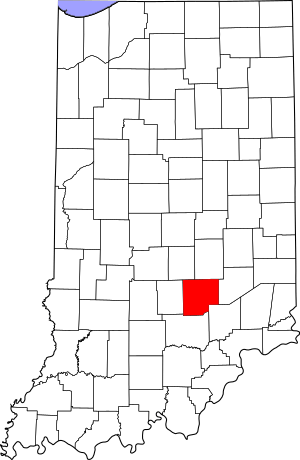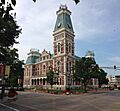National Register of Historic Places listings in Bartholomew County, Indiana facts for kids
This page tells you about special places in Bartholomew County, Indiana, that are listed on the National Register of Historic Places. Think of it like a very important list of buildings, areas, or sites that are super old or have a lot of history. They are kept safe so people can learn about them for many years to come.
These places are found all over Bartholomew County, in both towns and the countryside. You can even see where many of them are on a map using their exact location coordinates.
There are 24 amazing places from Bartholomew County on this list. Seven of these are even more special and are called National Historic Landmarks. This means they are important to the history of the entire United States!
Contents
Historic Treasures in Bartholomew County
Bartholomew County is home to many buildings and areas that have been recognized for their historical importance. These sites show us how people lived, worked, and built things in the past.
Homes with History
Some of the places on the list are old homes that tell stories of the families who lived there.
David Aikens House
The David Aikens House is a historic home located southwest of Columbus. It was added to the National Register in 2001, showing its importance to the area's history.
Elnora Daugherty Farm
The Elnora Daugherty Farm is another historic property, found south of Columbus in Sand Creek Township. This farm was listed in 1992, preserving its rural heritage.
James and Annetta Daugherty House and Barn
Also in the county is the James and Annetta Daugherty House and Barn, located in Wayne Township. This property, added in 2020, includes both a historic house and its barn, giving us a peek into farm life long ago.
William R. Gant Farm
The William R. Gant Farm, south of Columbus, was added to the list in 2000. It's another example of the important agricultural history of Bartholomew County.
D.W. Heagy Farm
The D.W. Heagy Farm, southwest of Columbus, was recognized in 1998. These old farms help us understand how farming shaped the region.
James Marr House and Farm
The James Marr House and Farm, northeast of Columbus, is a large historic property that spans across three townships: Columbus, Flat Rock, and German. It was listed in 1980.
McEwen-Samuels-Marr House
The McEwen-Samuels-Marr House is a beautiful historic home right in Columbus. It was added to the National Register in 1978, showing its architectural and historical value.
Newsom-Marr Farm
Another significant farm is the Newsom-Marr Farm, south of Columbus in Sand Creek Township. It was listed in 2002, adding to the collection of preserved agricultural sites.
Important Buildings in Columbus
Many of the listed places are in the city of Columbus, which is famous for its unique architecture.
Bartholomew County Courthouse
The Bartholomew County Courthouse is a grand building in Columbus, listed in 1979. It's where important county decisions have been made for many years.
Columbus City Hall
The Columbus City Hall is another key building in Columbus, added to the list in 1979. It has served as the center of city government.
Haw Creek Leather Company
The Haw Creek Leather Company building, at the junction of Washington and 1st Streets in Columbus, was listed in 1998. It reminds us of the industries that once thrived in the city.
Irwin Union Bank and Trust
The Irwin Union Bank and Trust building in Columbus is a very special place. It was designed by a famous architect and became a National Historic Landmark in 2000. This means it's super important to the history of architecture in the whole country.
Mabel McDowell Elementary School
The Mabel McDowell Elementary School in Columbus is also a National Historic Landmark, recognized in 2001. It's an important example of school design.
McKinley School
The McKinley School in Columbus was listed in 1988. It's another historic school building that has served the community for a long time.
Miller House
The Miller House in Columbus is a stunning example of modern architecture. It was designed by the famous architect Eero Saarinen and became a National Historic Landmark in 2000. It's a must-see for anyone interested in design.
The Republic Offices
The building for The Republic newspaper in Columbus was added to the National Register as a National Historic Landmark in 2012. It shows the importance of journalism and unique building design in the city.
Churches with Special Designs
Columbus is known for its modern architecture, and some of its churches are famous for their unique designs.
First Baptist Church
The First Baptist Church in Columbus is a National Historic Landmark, listed in 2000. It was designed by the architect Harry Weese and is known for its special look.
First Christian Church
The First Christian Church in Columbus is another National Historic Landmark, recognized in 2001. It was designed by Eliel Saarinen, a very important architect, and is a beautiful example of modern church design.
North Christian Church
The North Christian Church in Columbus also became a National Historic Landmark in 2000. Its unique design makes it stand out and is a great example of modern religious architecture.
Historic Districts and Bridges
Not just single buildings, but whole areas and bridges are also protected.
Columbus Historic District
The Columbus Historic District covers a large part of downtown Columbus. It was listed in 1982 and includes many important buildings and areas that show the city's history and unique architecture.
Hope Historic District
The town of Hope also has its own Hope Historic District, listed in 1991. This district helps preserve the historic feel and buildings of this charming town.
New Hope Bridge
The New Hope Bridge is a historic bridge located north of Columbus, crossing the Flatrock River. It was added to the National Register in 1999, recognized for its engineering and historical significance.
Pugh Ford Bridge
Another historic bridge is the Pugh Ford Bridge, northeast of Taylorsville, also crossing the Flatrock River. It was listed in 1999 and is an important part of the area's transportation history.
Images for kids
























